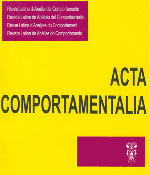Sobre el concepto de "proceso" cognitivo
DOI:
https://doi.org/10.32870/ac.v9i3.14642Palavras-chave:
Procesos psicológicos, fenómenos psicológicos, psicología.Resumo
La idea básica de este escrito es que la palabra «proceso» proviene de fuentes diversas, pero se ha convertido en un sucedáneo de eventos o fenómenos psicológicos. En contra de ello se argumenta, primero, que la mayoría de conceptos que son cualificados de procesos no lo son, desde un punto de vista lingüístico. Segundo, que desde un punto de vista científico, aquella palabra puede haber actuado como un vehículo interpretativo de lo que son los fenómenos psicológicos, pero ha acabado solapando el mismo objeto de estudio de la psicología. Es más, este solapamiento se ha convertido en propuesta de substitución con la adopción del símil maquinal o computacional de proceso. Se concluye afirmando que si no se definen los fenómenos psicológicos, mal se pueden definir sus procesos.
Downloads
Downloads
Como Citar
Edição
Seção
Licença

<a rel="license" href="http://creativecommons.org/licenses/by-nc-sa/4.0/"><img alt="Licencia de Creative Commons" style="border-width:0" src="https://i.creativecommons.org/l/by-nc-sa/4.0/88x31.png" /></a><br />Este obra está bajo una <a rel="license" href="http://creativecommons.org/licenses/by-nc-sa/4.0/">licencia de Creative Commons Reconocimiento-NoComercial-CompartirIgual 4.0 Internacional</a>.






